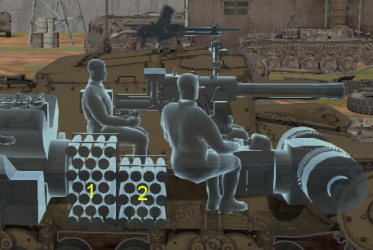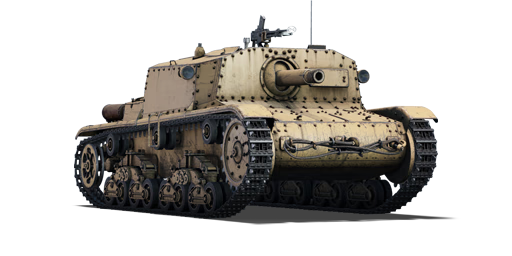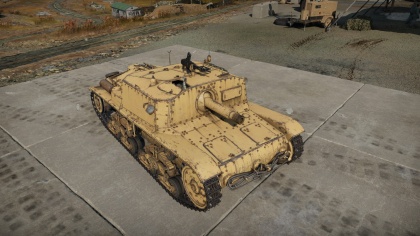Difference between revisions of "75/18 M41"
(→See also: Added vehicles) |
(→Survivability and armour: Completed section) |
||
| Line 9: | Line 9: | ||
== General info == | == General info == | ||
=== Survivability and armour === | === Survivability and armour === | ||
| − | <!--''Describe armour protection. Note the most well protected and key weak areas. Appreciate the layout of modules as well as the number and location of crew members. Is the level of armour protection sufficient, is the placement of modules helpful for survival in combat?'' | + | <!-- ''Describe armour protection. Note the most well protected and key weak areas. Appreciate the layout of modules as well as the number and location of crew members. Is the level of armour protection sufficient, is the placement of modules helpful for survival in combat? If necessary use a visual template to indicate the most secure and weak zones of the armour.'' --> |
| − | '' | + | '''Armour type:''' |
| − | |||
| − | Despite this, the | + | * Rolled homogeneous armour (hull, casemate) |
| + | * Cast homogeneous armour (gun mantlet) | ||
| + | |||
| + | {| class="wikitable" | ||
| + | |- | ||
| + | ! Armour !! Front (Slope angle) !! Sides !! Rear !! Roof | ||
| + | |- | ||
| + | | Hull || 25 mm (80°) ''Upper glacis'' <br> 30 mm (cylindrical) ''Lower plate'' || 25 mm || 25 mm ''Upper part'' <br> 27 mm (20°) ''Lower part'' || 25 mm (10°) ''Front glacis'' <br> 10 mm (16°) ''Rear - Engine hood'' <br> 5-25 mm (8°) ''Rear - Radiator vents'' | ||
| + | |- | ||
| + | | Casemate || 50 mm (5°) ''Casemate front plate'' <br> 50 + 50 mm (spherical) ''Gun mantlet'' <br> 30 mm (65°) ''Plate connecting with hull'' || 25 mm (8-9°) || 25 mm || 15 mm ''Centre'' <br> 15 mm (20°) ''Sides'' | ||
| + | |- | ||
| + | |} | ||
| + | |||
| + | '''Notes:''' | ||
| + | * Suspension wheels and bogies are 15 mm thick while tracks are 20 mm thick. | ||
| + | * The belly is 15 mm thick. | ||
| + | * Mudguards are 4 mm thick. | ||
| + | |||
| + | The Semovente 75/18 offers little in the way of effective protection, with its primary defence against enemy tanks being its small frontal profile. the 50 mm frontal plate struggles to keep out even rank 1 British and US guns at close range, while the extremely cramped interior means that penetrations will often knock out multiple crew members or modules in a single shot. | ||
| + | |||
| + | Despite this, the {{PAGENAME}}'s armour is still capable of keeping out machine gun fire from most angles, and its fully-encloses design offers protection aircraft machine-guns unlike many of its low-rank open-top contemporaries. | ||
=== Mobility === | === Mobility === | ||
Revision as of 12:03, 3 November 2020
Contents
Description
The Semovente 75/18 M41 is a rank Italian tank destroyer
with a battle rating of (AB), (RB), and (SB). It was introduced in Update 1.85 "Supersonic".
General info
Survivability and armour
Armour type:
- Rolled homogeneous armour (hull, casemate)
- Cast homogeneous armour (gun mantlet)
| Armour | Front (Slope angle) | Sides | Rear | Roof |
|---|---|---|---|---|
| Hull | 25 mm (80°) Upper glacis 30 mm (cylindrical) Lower plate |
25 mm | 25 mm Upper part 27 mm (20°) Lower part |
25 mm (10°) Front glacis 10 mm (16°) Rear - Engine hood 5-25 mm (8°) Rear - Radiator vents |
| Casemate | 50 mm (5°) Casemate front plate 50 + 50 mm (spherical) Gun mantlet 30 mm (65°) Plate connecting with hull |
25 mm (8-9°) | 25 mm | 15 mm Centre 15 mm (20°) Sides |
Notes:
- Suspension wheels and bogies are 15 mm thick while tracks are 20 mm thick.
- The belly is 15 mm thick.
- Mudguards are 4 mm thick.
The Semovente 75/18 offers little in the way of effective protection, with its primary defence against enemy tanks being its small frontal profile. the 50 mm frontal plate struggles to keep out even rank 1 British and US guns at close range, while the extremely cramped interior means that penetrations will often knock out multiple crew members or modules in a single shot.
Despite this, the 75/18 M41's armour is still capable of keeping out machine gun fire from most angles, and its fully-encloses design offers protection aircraft machine-guns unlike many of its low-rank open-top contemporaries.
Mobility
| Game Mode | Max Speed (km/h) | Weight (tons) | Engine power (horsepower) | Power-to-weight ratio (hp/ton) | |||
|---|---|---|---|---|---|---|---|
| Forward | Reverse | Stock | Upgraded | Stock | Upgraded | ||
| Arcade | Expression error: Unexpected * operator. | 227 | Expression error: Unexpected round operator. | __.__ | |||
| Realistic | 142 | Expression error: Unexpected round operator. | __.__ | ||||
The 75/18 M41 is reasonably mobile for a low-rank tank destroyer, hitting around 30km/h on flat ground off-road with a fairly fast hull traverse and a poor reverse speed.
Armaments
Main armament
| 75 mm 75/18 mod.34 | Turret rotation speed (°/s) | Reloading rate (seconds) | |||||||||||
|---|---|---|---|---|---|---|---|---|---|---|---|---|---|
| Mode | Capacity | Vertical | Horizontal | Stabilizer | Stock | Upgraded | Full | Expert | Aced | Stock | Full | Expert | Aced |
| Arcade | 43 | -12°/+22° | ±18° | N/A | 12.3 | 17.1 | __._ | __._ | 24.4 | 7.80 | _.__ | _.__ | 6.00 |
| Realistic | 8.3 | 9.8 | __._ | __._ | 14.0 | ||||||||
Ammunition
| Penetration statistics | |||||||
|---|---|---|---|---|---|---|---|
| Ammunition | Type of warhead |
Penetration @ 0° Angle of Attack (mm) | |||||
| 10 m | 100 m | 500 m | 1,000 m | 1,500 m | 2,000 m | ||
| Granata Perforante da 75 | APCBC | 45 | 44 | 39 | 33 | 29 | 25 |
| Granata mod.32 | HE | 10 | 10 | 10 | 10 | 10 | 10 |
| Granata Perforante mod.32 | APCBC | 52 | 50 | 44 | 38 | 33 | 28 |
| EPS M42 | HEAT | 100 | 100 | 100 | 100 | 100 | 100 |
| Shell details | |||||||||
|---|---|---|---|---|---|---|---|---|---|
| Ammunition | Type of warhead |
Velocity (m/s) |
Projectile Mass (kg) |
Fuse delay (m) |
Fuse sensitivity (mm) |
Explosive Mass (TNT equivalent) (g) |
Ricochet | ||
| 0% | 50% | 100% | |||||||
| Granata Perforante da 75 | APCBC | 425 | 6.4 | 1.2 | 14 | 270 | 48° | 63° | 71° |
| Granata mod.32 | HE | 450 | 6.4 | 0.1 | 0.1 | 610 | 79° | 80° | 81° |
| Granata Perforante mod.32 | APCBC | 476 | 6.3 | 1.2 | 14 | 270 | 48° | 63° | 71° |
| EPS M42 | HEAT | 399 | 5.3 | 0.0 | 0.1 | 640 | 62° | 69° | 73° |
| Smoke shell characteristics | ||||||
|---|---|---|---|---|---|---|
| Ammunition | Velocity (m/s) |
Projectile Mass (kg) |
Screen radius (m) |
Screen deploy time (s) |
Screen hold time (s) |
Explosive Mass (TNT equivalent) (g) |
| Gr. Fumogena | 450 | 6.4 | 13 | 5 | 20 | 50 |
Ammo racks

Last updated: 1.101.1.16
| Full ammo |
1st rack empty |
2nd rack empty |
Visual discrepancy |
|---|---|---|---|
| 43 | 19 (+24) | 1 (+42) | No |
Notes:
- Shells are modeled individually and disappear after having been shot or loaded.
Machine guns
| 8 mm Breda Mod. 38 | ||||||
|---|---|---|---|---|---|---|
| Pintle mount | ||||||
| Capacity (Belt capacity) | Fire rate (shots/minute) |
Vertical guidance |
Horizontal guidance | |||
| 504 (24) | 600 | __° | __° | |||
Usage in battles
The Semovente will struggle to be effective with the extremely poor penetration of its APHE rounds. With a max penetration of barely 50mm at point-blank range, the vehicle will have problems penetrating the angled front armour of many similar rank vehicles, with light-tanks, armoured cars and SPAA being the best targets. In a full up-tier, the Semovente will struggle to do any damage at all with stock shells, with the sole exception of light tanks and AA vehicles.
In this case, it is best for drivers to attempt to flank and shoot enemies from the side, where the powerful explosive capacity of the APHE shells offer excellent single-shot knock-out capability.
The vehicle's effectiveness improves massively once the HEAT shell is unlocked, with 100mm of penetration at all ranges. This allows for reliable penetration of practically all the Semovente's potential adversaries with the vehicle's most dangerous opponents being fast and agile light tanks such as the M22, which can easily penetrate the Semovente from close range and whose speed and size make a difficult target for the Semovente's low-velocity howitzer.
With the HEAT shell, the Semovente can make for an effective support vehicle, albeit one whose lack of survivability punishes positional mistakes harshly. The one thing to remember about the HEAT shell is that it sacrifices the one-shot capability of APHE, meaning that larger tanks will often take multiple hits to disable, and its even lower velocity makes its excellent long-range penetration difficult to exploit.
Modules
| Tier | Mobility | Protection | Firepower | ||
|---|---|---|---|---|---|
| I | Tracks | Parts | Horizontal Drive | ||
| II | Suspension | Brake System | FPE | Adjustment of Fire | Granata Perforante mod.32 |
| III | Filters | Crew Replenishment | Elevation Mechanism | EPS M42 | |
| IV | Transmission | Engine | Gr. Fumogena | ||
Pros and cons
Pros:
- Good penetration with the HEAT shell
- Top-mounted machine gun offers some utility not available to many low-rank tank destroyers
- 75/18 M41's position in the tech tree can allow for a decent aircraft and tank lineup with vehicles like the AB43 scout, M15/42 medium tank, and Re.2001 CB fighter-bomber
Cons:
- Poor armour and survivability
- Mediocre mobility
- Low-velocity gun with a slow reload makes long-range shots difficult
- Poor post-penetration damage with the HEAT shell, and terrible penetration with either APHE
History
The Semovente 75/18 was originally intended to be a self-propelled gun rather than a tank destroyer, with the War Thunder version being the later-model improved variant built upon the M41 tank chassis with improved armour.
In response to the poor effectiveness of existing Italian tank destroyer designs such as the 47/32 L40, the Semovente was pressed into service to combat US-built M3 Lee and Stuart tanks in service with the British Army in North Africa. Utilising a HEAT shell, the Semovente proved to be an effective counter to early-war British tanks, with its small size making it ideal for dug-in defensive positions where its lack of speed wasn't an issue.
In one engagement in 1942, Semovente vehicles of the Ariete Division repelled an attack from 40 British light and medium tanks, destroying 20 with no losses of their own. While the Semovente's HEAT shell proved effective against early-war tank designs, tougher Allied tanks such as the M4 Sherman represented a new challenge. This, as well as the Semovente's cramped interior, low-velocity gun and under-powered engine lead to the development of larger and faster dedicated tank destroyer designs with superior firepower.
Approximately 60 were built on the M40 tank chassis in early 1941, with another 162 built after that date on the M41 chassis. Two self-propelled gun (Semovente) battalions were assigned to the artillery regiment of each armored division, each containing 2-3 batteries of 4-6 AFV each. Approximately 250 more were built on the M42 chassis, also used by the M15/42 tank, starting in early 1943, which continued to use the 75/18 howitzer as the previous models because the planned gun for the M42 variant was not yet in service. At the time the plan was for the Italian medium tank battalions to change from three companies of tanks, to one of tanks and two of assault guns. In September, 1943, some 75/18s saw action against German forces. 178 were confiscated or built in occupied Italy by Germany after the Italian surrender, and used in Italy and the Balkans.
Media
- Skins
- Videos
See also
- Vehicles equipped with the same chassis
- Other vehicles of similar configuration and role
External links
| Italy tank destroyers | |
|---|---|
| Italy | |
| M41 | 75/18 M41 · 75/32 M41 · 90/53 M41M |
| M42 | 75/34 M42 |
| M43 | 105/25 M43 · M43 "G.C.Leoncello" · 75/34 M43 · 75/46 M43 |
| Wheeled | Lancia 3Ro (100/17) · AS 42/47 · Breda 90/53 · Breda 501 |
| Other | L3/33 CC · 47/32 L40 |
| Germany | ▄StuG III G |
| USA | M36B1 · ▄M109G · M113A1 (TOW) |
| Hungary | |
| Zrínyi | Zrinyi I · Zrinyi II |
| USSR | ◔2S1 |





